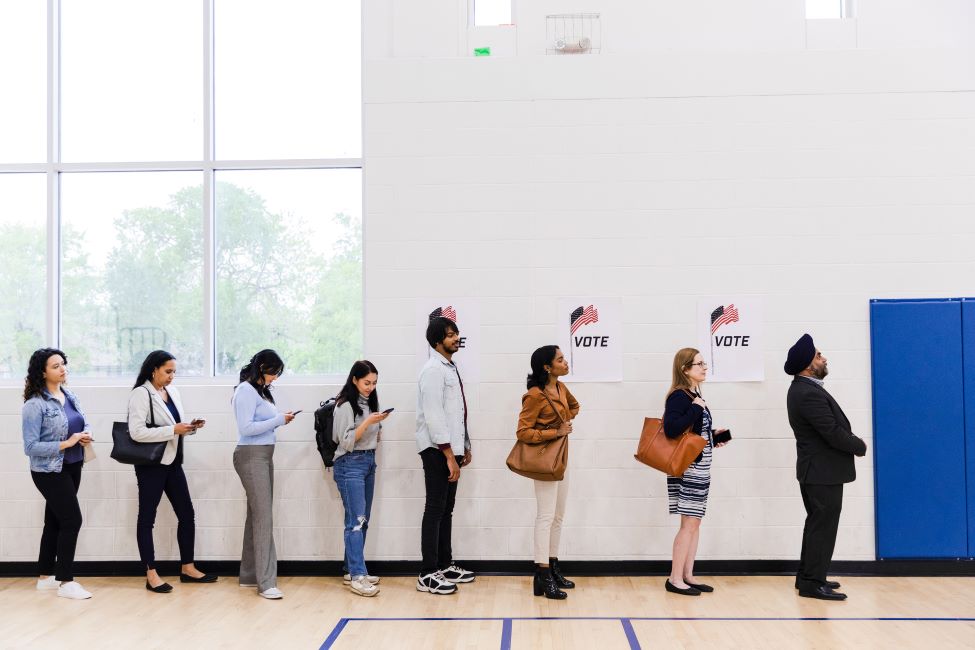National Poll Reveals Immigration and Incivility Key Issues for Voters

What are American voters thinking in 2024?
Immigration and incivility are two major issues that continue to inform voter behavior and expectations in U.S. politics and the 2024 the presidential election, according to the latest national poll by the FAU Political Communication and Public Opinion Research Lab (PolCom Lab) and Mainstreet Research.
Immigration: Divisive Issues of Culture and Trust
The pollsters asked respondents about the effect of immigration on American culture and approximately 42 percent responded that they think immigration has a weakening effect on American culture while 45 percent answered that immigration strengthens American culture. Approximately 66 percent of Hispanics responded that immigration has a strengthening effect. There is a split between supporters of U.S. President Joe Biden and supporters of former U.S. President Donald Trump on whether immigration strengthens American culture with 64 percent of Biden supporters answering that immigration strengthens it and about 60 percent of Trump supporters responding that immigration weakens American culture.
When respondents were asked whether they would like to have an immigrant as a neighbor, 64 percent said, “Yes,” while 36 percent responded, “No.” Of Biden supporters, 78.6 percent responded affirmatively, while 21 percent said they would not like to have an immigrant as a neighbor. Trump supporters were split with 51 percent saying they would and 49 percent saying they would not like a neighbor that is an immigrant. Hispanics resoundingly responded yes, with 83 percent saying they would like a neighbor that is an immigrant.
When asked about the issue of immigration, approximately half of the respondents expressed distrust of state governments while 44 percent expressed trust to address issues related to immigration. Similar levels of trust and distrust were recorded for the federal agency Immigration and Customs Enforcement with approximately 46 percent of people expressing distrust and 42 percent expressing trust in the organization. Respondents were also asked about their trust in border patrol with more, 49 percent, responding they had general trust and 40 percent expressed distrust. A higher level of distrust was shown toward immigration courts with 50 percent of respondents saying that they did not have trust in these courts, and 35 percent expressing trust in them.
“Immigration will be a pivotal issue in the upcoming months leading to the election," said Luzmarina Garcia, Ph.D., assistant professor of political science at FAU and PolCom Lab-affiliated researcher. “These data show a national divide in immigration attitudes while demonstrating general support for most immigration authorities.”
The poll also asked people their opinions on the amount of time it takes to become a U.S. permanent resident. More feel it is too long, 30 percent, while 21 percent answered that it is too short, and 26 percent responded that the current amount of time was about right.
“Narratives surrounding immigration are long-standing in U.S. politics, just as they are in the creation of the nation’s fabric. But they continue to be divisive narratives, to be sure,” said Robert E. Gutsche, Jr., Ph.D., associate professor in the School of Communication and Multimedia Studies at FAU and strategic lead at PolCom Lab. “How we as a public talk about institutions, individuals and ideas about immigration increasingly become personal and that is where politicians and citizens can find solutions or create more separation.”
Incivility Remains a Critical Influence on Voter Choice
The recent poll also reveals the state of civility in U.S. politics.
An overwhelming 80 percent of voters expressed their disapproval of political name-calling. Similarly, 69 percent found it unacceptable to criticize the personal characteristics of opposing candidates, and 81 percent disapproved of candidates attacking the families of their rivals.
“Voters recognize negative campaigning can contribute to a toxic political climate, impede constructive debate, and erode public trust in the political process,” said Carol Bishop Mills, Ph.D., communication professor at FAU, PolCom co-director, and expert in bullying research.
Notably, women (82 percent disapproved of nicknaming political opponents and 85 percent disapproved of attacking family members) and voters aged 50 and above (93 percent disapprove of attacking family members) were more likely to consider such behaviors problematic, while registered Republicans (75 percent and 73 disapproving on the same two actions, respectively) demonstrated a higher likelihood of endorsing negative campaigning compared to their Democratic counterparts.
“When candidates resort to attacking each other and their families, they divert attention from crucial issues that may influence voting choices,” Mills said. “However, certain voters may be willing to support incivility if it aligns with the overall views of the candidates.”
All the data on these issues and more can be found at the FAU PolCom Lab website.
This poll was conducted from Friday, Feb. 2 to Saturday, Feb. 3, among a sample of 1,180 adults, 18 years of age or older, living in the United States. The survey was conducted using a text message survey of registered voters and an online panel of registered voters, so a margin of error cannot be assigned. The survey is intended to represent the voting population in United States.
-FAU-
Tags: arts and letters